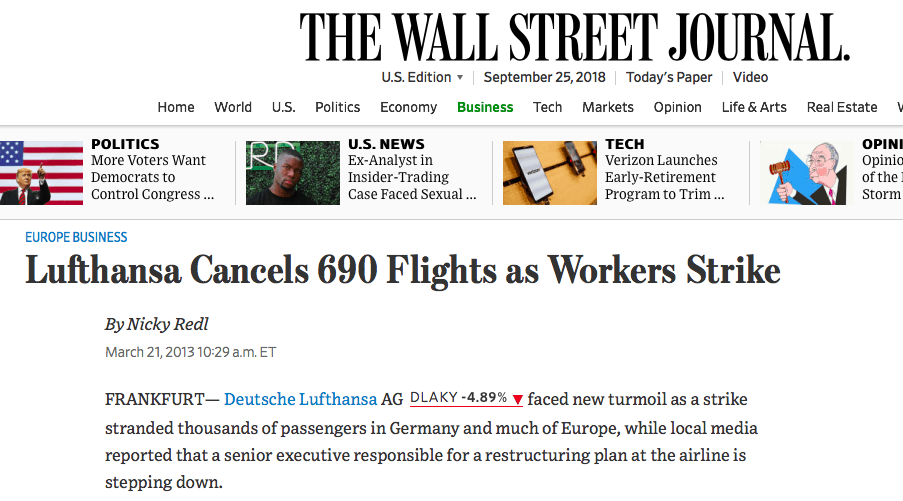FRANKFURT— Deutsche Lufthansa AG DLAKY -4.89% faced new turmoil as a strike stranded thousands of passengers in Germany and much of Europe, while local media reported that a senior executive responsible for a restructuring plan at the airline is stepping down.
Lufthansa, Europe’s biggest airline by passengers, said it canceled nearly 690 flights Thursday as staff walked out on a seven-hour strike ahead of talks expected Friday over pay and working conditions.
Lufthansa’s board member responsible for labor relations, Stefan Lauer, is set to resign June 30, German media reported. The airline declined to comment, and Mr. Lauer wasn’t available for comment.
The strike was the latest in a series of Lufthansa stoppages that have disrupted air travel in Germany in the past year and taken a chunk out of the airline’s earnings. Lufthansa is trying to bolster its finances so it can avoid jeopardizing a planned multibillion-euro investment in new, more-fuel-efficient aircraft.
In the first round of negotiations between Lufthansa and the ver.di union, which ended in February, the union demanded a 5.2% wage increase over 12 months. Lufthansa has asked employees for a two-year freeze on wages and a one-hour increase in the working week.
Strikes by Lufthansa employees and airport workers cost the airline €33 million ($43 million) last year. Lufthansa’s operating profit fell more than 36% to €524 million even though revenue increased nearly 5%, to €30.1 billion.
Lufthansa isn’t alone among European airlines in confronting angry staff as the carriers try to cope with high fuel prices, fierce competition and slack economic activity. Staff at Iberia, the Spanish unit of International Consolidated Airlines Group SA, have struck on and off to protest a restructuring plan for the unprofitable airline. A revised restructuring program accepted by Iberia employees averted strikes planned for March.
Lufthansa’s cancellations on Thursday mostly affected domestic and short-distance flights, with long-distance flights largely going ahead as scheduled. The strikes took place at German airports, in Frankfurt, Hamburg, Berlin, Düsseldorf, Cologne and Munich, and several other locations.
A Lufthansa spokesman said the strike, which the unions had announced in advance, didn’t disrupt travel as much as last year’s work stoppages because passengers had time to make alternate plans. The airline wasn’t able to estimate what the strike would cost the carrier, he said.
A work stoppage by security personnel at several airports over the past two months meant that thousands of passengers couldn’t reach their flights. Labor action by Lufthansa cabin crew last year caused widespread chaos.
This article was published by The Wall Street Journal on March 21, 2013.
